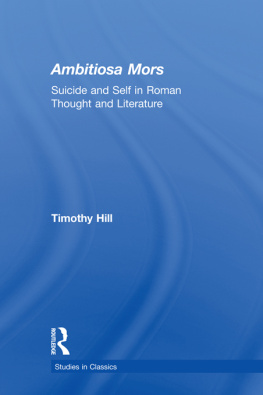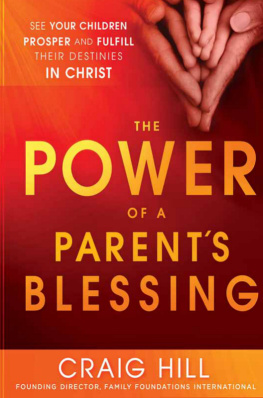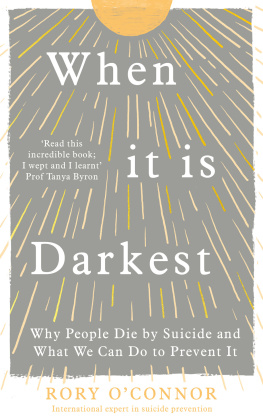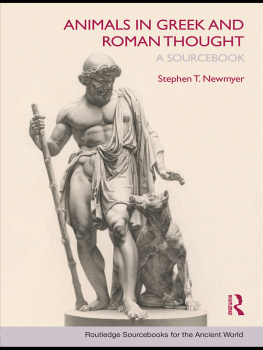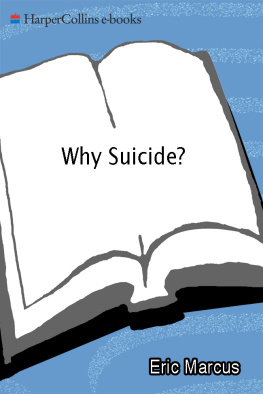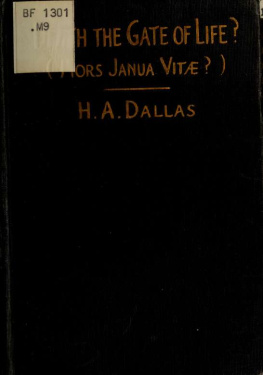Hill - Ambitiosa mors: suicide and the self in Roman thought and literature
Here you can read online Hill - Ambitiosa mors: suicide and the self in Roman thought and literature full text of the book (entire story) in english for free. Download pdf and epub, get meaning, cover and reviews about this ebook. City: London;New York, year: 2004, publisher: Routledge, genre: Religion. Description of the work, (preface) as well as reviews are available. Best literature library LitArk.com created for fans of good reading and offers a wide selection of genres:
Romance novel
Science fiction
Adventure
Detective
Science
History
Home and family
Prose
Art
Politics
Computer
Non-fiction
Religion
Business
Children
Humor
Choose a favorite category and find really read worthwhile books. Enjoy immersion in the world of imagination, feel the emotions of the characters or learn something new for yourself, make an fascinating discovery.
Ambitiosa mors: suicide and the self in Roman thought and literature: summary, description and annotation
We offer to read an annotation, description, summary or preface (depends on what the author of the book "Ambitiosa mors: suicide and the self in Roman thought and literature" wrote himself). If you haven't found the necessary information about the book — write in the comments, we will try to find it.
Hill: author's other books
Who wrote Ambitiosa mors: suicide and the self in Roman thought and literature? Find out the surname, the name of the author of the book and a list of all author's works by series.
Ambitiosa mors: suicide and the self in Roman thought and literature — read online for free the complete book (whole text) full work
Below is the text of the book, divided by pages. System saving the place of the last page read, allows you to conveniently read the book "Ambitiosa mors: suicide and the self in Roman thought and literature" online for free, without having to search again every time where you left off. Put a bookmark, and you can go to the page where you finished reading at any time.
Font size:
Interval:
Bookmark:

Studies in Classics
Volume 10
Edited by
Dirk Obbink | Andrew Dyck |
Oxford University | The University of California, Los Angeles |
A ROUTLEDGE SERIES
OTHER BOOKS IN THIS SERIES:
SINGULAR DEDICATIONS
Founders and Innovators of Private Cults in Classical Greece
Andrea Purvis
EMPEDOCLES
An Interpretation
Simon Trpanier
FOR SALVATIONS SAKE
Provincial Loyalty, Personal Religion, and Epigraphic Production in the Roman and Late Antique Near East
Jason Moralee
APHRODITE AND EROS
The Development of Greek Erotic Mythology
Barbara Breitenberger
A LINGUISTIC COMMENTARY ON LIVIUS ANDRONICUS
Ivy Livingston
RHETORIC IN CICEROS PRO BALBO
Kimberly A. Barber
HYPERBOREANS
Myth and History in Celtic-Hellenic Contacts
Timothy P. Bridgman
STUDIES IN THE PROSODY OF PLAUTINE LATIN
Benjamin W. Fortson IV
ARISTOXENUS OF TARENTUM AND THE BIRTH OF MUSICOLOGY
Sophie Gibson
AMBITIOSA MORS
Suicide and Self in Roman Thought and Literature
Timothy Hill
Routledge
New York and London
Published in 2004 by
Routledge
270 Madison Avenue
New York, NY 10016
Published in Great Britain by
Routledge
11 New Fetter Lane
London EC4P 4EE
Copyright 2004 by Routledge
Routledge is an imprint of the Taylor & Francis Group.
Printed in the United States of America on acid-free paper.
All rights reserved. No part of this book may be reprinted or reproduced or utilized in any form or by any electronic, mechanical, or other means, now known or hereafter invented, including photocopying and recording, or in any information storage or retrieval system without permission in writing from the publisher.
10 9 8 7 6 5 4 3 2 1
Library of Congress Cataloging-in-Publication Data
Hill, Timothy, 1973
Ambitiosa mors : suicide and the self in Roman thought and literature / Timothy Hill.
p. cm. (Studies in classics ; v. 10)
Includes bibliographical references and index.
ISBN 0-415-97097-0 (hardcover : alk. paper)
1. SuicideRome. I. Title. II. Series: Studies in classics
(Routledge (Firm)) ; v. 10.
HV6543.H55 2004
362.280937dc22
2003027566
Contents
A Note on the Translations
In order to make this book accessible to those who are not specialists in the field of Classical literature, all ancient language passages quoted in this book are provided with a following translation. The purpose of these translations is simply to give the Latin- and/or Greekless reader an accurate understanding of what it is the ancient authors are communicating, and the only stylistic aspiration of these translations is clarity. This has two implications for the translations that should be borne in mind when using them. First, the majority of stylistic and rhetorical effects present in the original Latin or Greek texts do not appear in the corresponding English translations; to take the most obvious example of this unfortunate stylistic leveling, poetry is throughout this work translated with prose. Second, this emphasis on intelligibility has meant that the grammar of the translation does not always closely reflect that of the original tongue; plurals, for instance, are often translated with singulars, and passive verbs as active. Readers who desire translations which reflect something of the varied grace, power, and subtlety of linguistic effect found in our Greek and Latin source texts are referred to the numerous literary translations available; those, on the other hand, who require a more literal rendering are pointed in the direction of the well-known Loeb series.
Outside these extended quotations from ancient authors, Greek and Latin are also used throughout this book in relation to certain key terms and concepts which are central to ancient thinking but which have no precise equivalents in modern English. Words such as eudaimonia, virtus, and ratio, for instance, are essentially untranslatable, because each has a semantic range extending far beyond any single English word; as a result, they are used throughout this book in untranslated form. Rather than provide the reader with varying (and thus potentially confusing) translations of these terms to suit the varying contexts in which they are found in the following chapters, a glossary of these terms has been provided. While a basic translation of each of these key terms is given the first time it appears in the text, readers who either forget this definition in the course of reading, or who desire a more nuanced understanding of the meaning of the term, can always refer to the back of the book to refresh their memories or extend their knowledge.
Series Editors Foreword
Studies in Classics aims to bring high-quality work by emerging scholars to the attention of a wider audience. Emphasizing the study of classical literature and history, these volumes contribute to the theoretical understanding of human culture and society over time. This series will offer an array of approaches to the study of Greek and Latin (including medieval and Neolatin), authors and their reception, canons, transmission of texts, ideas, religion, history of scholarship, narrative, and the nature of evidence.
While the focus is on Mediterranean cultures of the Greco-Roman era, perspectives from other areas, cultural backgrounds, and eras are to be included as important means to the reconstruction of fragmentary evidence and the exploration of models. The series will reflect upon the role classical studies has played in humanistic endeavors from antiquity to the present, and explore select ways in which the discipline can bring both traditional scholarly tools and the experience of modernity to bear on questions and texts of enduring importance.
Dirk Obbink, Oxford University
Andrew Dyck, The University of California, Los Angeles
Acknowledgments
When I first elected to write a thesis on the topic of suicide in Roman thought and literature, I had no idea how large a question I was attempting to answer. Over the next four years, its scope was to encompass not only vast swathes of Latin literature and philosophy, but to stretch into Greek thought, Roman history, twentieth-century sociology, and beyond. As a result, this work could never have been completed without the contributions of numerous readers who donated their time and expertise to directing and defining its central lines of enquiry, to pointing out flaws and errors, and to reading the chapters which make up this thesis and suggesting improvements.
The first debt of gratitude is of course owed to my thesis advisors at Royal Holloway, University of London. Professors Anne Sheppard, Susanna Braund, and Jonathan Powell were universally generous in the time they devoted to supervising this thesis, and their observations and criticisms were invariably helpful and incisive. I am also grateful to my fellow graduate student Giles Gilbert for looking over and commenting upon several chapters of this work, and a significant debt is in addition owed to my two thesis examiners, professors Christopher Gill and Catharine Edwards.
In addition to all the academic guidance and help I received, numerous friends and family also played a part in allowing this study to see the light of day. Of these the most important are Emma Kell, whose kindness extended even to proofreading the thing; Ravi Vadgama, whose patience and ink-cartridges were never exhausted; and of course, my wife, Taryn Neale, whose unfailing support, willingness to read incoherent rough drafts, and general sense of perspective were all crucial to the work getting done at all. To all of the above, and many more, I am profoundly grateful.
Next pageFont size:
Interval:
Bookmark:
Similar books «Ambitiosa mors: suicide and the self in Roman thought and literature»
Look at similar books to Ambitiosa mors: suicide and the self in Roman thought and literature. We have selected literature similar in name and meaning in the hope of providing readers with more options to find new, interesting, not yet read works.
Discussion, reviews of the book Ambitiosa mors: suicide and the self in Roman thought and literature and just readers' own opinions. Leave your comments, write what you think about the work, its meaning or the main characters. Specify what exactly you liked and what you didn't like, and why you think so.

